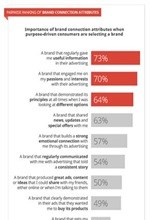Your customer is not a dummy
In the 80's, marketers realised the 30 second TV ad just doesn't cut it. It's too easy to avoid. It's this reality that made advertisers go ubiquitous: merge advertising with your everyday life. If you won't watch the ads, they'll be in the news you read, the movies you watch, the music you listen to and the sports you play.
Last year, Google, TNS and Unilever did a joint study that concluded "Consumers choose the brands that engage them on their passions and interests 42% more often than they do those that simply urge them to buy the product being advertised."
The chart illustrates the factors that influence buying decisions. Clearly, advertisers who understand their customers' interests get the highest return.
Movies, TV shows, theatre plays and comedy shows have passionate fans; if the on-going debate on Jon Snow's death in Game of Thrones is anything to go by. Brand custodians definitely want a piece of this love and do so by partnering with producers. They fund part (or all) of the production budget, and get a cameo appearance in the movie/show. This is product placement and it's big business in Hollywood. Smurfs 2 - the film - covered the entire cost of its $105m dollar budget with $150m worth of product placement deals.
Here in Kenya, local productions have increased in quality and number. Comedy is a big hit with several live shows on prime TV, most notable is Churchill Live. Situation comedies, soap operas, wedding shows, daytime talk shows fill our screens with great content. We also have several cultural TV stations that broadcast in vernacular. There's nothing quite like watching evening news in Luo (language).
Due to the high ratings and adoring fans, some advertisers have shown interest in TV shows. Though, I wouldn't call it product placement. It's more like "bring-that-script-I-place-an-ad-in-your-show".
Burn, a manufacturer of cooking appliances, featured on a popular show, Papa Shirandula. You can view the episode here. Similar instances of "product placement" are narrated by Jefferson Were here. Crown Paints also featured in Vanessa Mdee's music video. And it seems the same trend is in Nollywood too.
According to Daisy Busolo, head of production at Wholesome Entertainment, "local advertisers lack understanding of how show business works. This means when they do sponsor a show, they interfere with the script as they want a mention done like an ad."
This may come from the sales pressure marketers are under to get short term results. In the long run, however, we have to accept that customers are at different points in the path to purchase.
For the producers, though, the journey has just begun. "It's a catch 22." Daisy continues, "We need to create good quality productions that brands can associate with; but the making of such requires a lot of capital."
I believe, training on the entire production ecosystem can unearth new brand engagement opportunities that marketers are not aware of. We also have to keep in mind this is a niche, targeted medium. If the product matches the audience, there's no need to over-emphasise the point. And contrary to views expressed in boardroom meetings, your customers are not dummies.

























